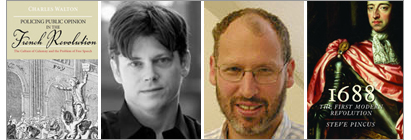
Charles Walton, Assistant Professor of History, has been awarded the 2010 Gaddis Smith International Book Prize by the MacMillan Center for his book, Policing Public Opinion in the French Revolution: The Culture of Calumny & the Problem of Free Speech (Oxford University Press, 2008). Steven Pincus, Professor of History, has been awarded the 2010 Gustav Ranis International Book Prize by the MacMillan Center for his book, 1688: The First Modern Revolution (Yale University Press, 2009).
Established in 2004 to recognize the distinguished legacy of two former Directors of the MacMillan Center, the prizes are awarded for books on international topics written by current members of the Yale faculty. Award recipients receive a research appointment at the MacMillan Center, and a $10,000 research award over two years.
Policing Public Opinion in the French Revolution
In the 1789 Declaration of the Rights of Man and of the Citizen, French revolutionaries proclaimed the freedom of speech, religion, and opinion. A mere four years later, the country descended into a period of political terror, as thousands were arrested, tried, and executed for crimes of expression and opinion. In Policing Public Opinion in the French Revolution, Professor Walton traces the origins of this reversal back to the Old Regime. He shows that while early advocates of press freedom sought to abolish prepublication censorship, the majority still firmly believed injurious speech – or calumny – constituted a crime. With its emphasis on how revolutionaries drew upon cultural and political legacies of the Old Regime, this study sheds new light on the origins of the Terror and the French Revolution, as well as the history of free expression.
According to the judging panel, Policing Public Opinion in the French Revolution was chosen because it gives “a highly original and compelling account of the radicalization of the French Revolution, linking the democratization of honor with the effects of free speech. Walton uses a wide range of sources to propose an innovative argument on an enduring question of big historical and political import.”
1688: The First Modern Revolution
For two hundred years, historians have viewed England’s Glorious Revolution of 1688–1689 as an un-revolutionary revolution – bloodless, consensual, aristocratic, and above all, sensible. In this new interpretation, Professor Pincus refutes this traditional view in 1688: The First Modern Revolution.
According to the judging panel, 1688: The First Modern Revolution was chosen because “the challenge it presents to well-worn understandings of the 1688 ‘Glorious Revolution’ is twofold: first, he taps a wide range of previously unstudied primary sources, and second, using new scholarship in history and political science, he is able to place the Glorious Revolution in the context of other modern revolutions. Professor Pincus shows that far from nonviolent, consensual, and elite, the Revolution was in fact violent, popular, and transformational. In the process of re-envisioning of the events of 1688 as the first ‘modern’ revolution, the book offers a new lens on the rise of modern liberal society itself.”
